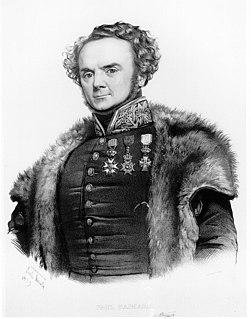
Joseph Paul Gaimard was a French naval surgeon and naturalist.
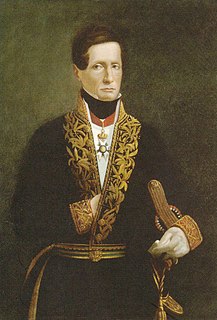
Jean René Constant Quoy was a French naval surgeon, zoologist and anatomist.

The yellow-rumped thornbill is a species of passerine bird from the genus Acanthiza. The genus was once placed in the family Pardalotidae but that family was split and it is now in the family Acanthizidae. There are four subspecies of yellow-rumped thornbill. It is a small, brownish bird with a distinctive yellow rump and thin dark bill. It inhabits savannah, scrub and forests across most of Australia and eats insects. The species engages in cooperative breeding.

The New Zealand fernbird or simply fernbird is an insectivorous bird endemic to New Zealand. In the Māori language, it is named kōtātā or mātātā.

The bare-backed fruit bat or Moluccan naked-backed fruit bat is a fruit bat in the family Pteropodidae.

The nightingale reed warbler, or Guam reed-warbler, was a songbird endemic to Guam. It has not been seen since the 1960.

Muscicapa is a genus of passerine birds belonging to the Old World flycatcher family Muscicapidae, and therein to the typical flycatchers of subfamily Muscicapinae. They are widespread across Europe, Africa and Asia with most species occurring in forest and woodland habitats. Several species are migratory, moving south from Europe and northern Asia for the winter.

The rusty-winged starling is a species of starling in the family Sturnidae. It is found in the Santa Cruz Islands and Vanuatu.

The paradise drongo or ribbon-tailed drongo is a species of bird in the family Dicruridae. It is endemic to New Ireland in the Bismarck Archipelago, Papua New Guinea. With a total length of 51 to 63 cm and body mass of 130 g (4.6 oz), this may be the largest species of drongo.

The White-breasted Robin is a passerine bird in the Australasian robin family Petroicidae and the Yellow Robin genus Eopsaltria. Occasionally it is placed in the genus Quoyornis. It is endemic to southwestern Australia. Unlike many other Australian robins, it lacks bright colours in its plumage, being a predominantly greyish bird with white underparts. Like other closely related Australasian robins, it is a cooperative breeder. It is sedentary, with pairs or small groups maintaining territories.
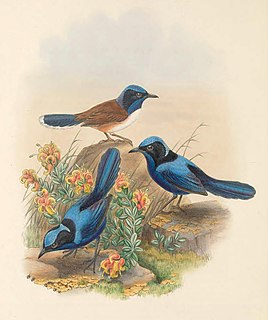
The emperor fairywren is a species of bird in the Australasian wren family, Maluridae. It is found in New Guinea in its natural habitat of subtropical or tropical moist lowland forests. It is the largest species of fairywren. It is highly sexually dimorphic. Males have a blue and black plumage, with the females having blue and black plumage only on their heads, with the rest of the body being coloured a rusty brown and having a black tail tipped with white. There are 3 recognized subspecies of the emperor fairywren, one from north and northwestern New Guinea, one from Biak Island, and one from south New Guinea and the Aru Islands.

The dusky robin is a small passerine bird native to Tasmania. A member of the Australian robin family Petroicidae, it is known by many other names such as Dozey, Sad, Sleepy, Stump, Tasmania/Wood Robin; Native Sparrow or Sad Bird.

The spot-winged monarch, or spot-wing monarch flycatcher, is a species of bird in the family Monarchidae. It is found in Indonesia and Papua New Guinea. Its natural habitat is subtropical or tropical moist lowland forests.
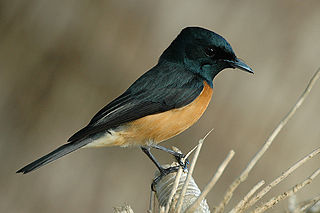
The Vanikoro flycatcher is a species of monarch flycatcher in the family Monarchidae. It has a slightly disjunct distribution, occurring on Vanikoro island and in Fiji.

Chromodoris magnifica is a sea slug, a species of nudibranch, a shell-less marine gastropod mollusc in the family Chromodorididae. It is the type species of the genus Chromodoris.
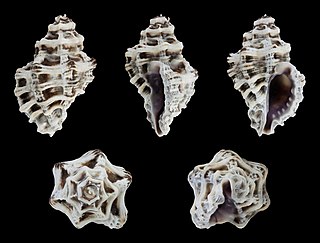
Murichorda fiscellum, common name : the little basket drupe, is a species of sea snail, a marine gastropod mollusk in the family Muricidae, the murex snails or rock snails.
Mexichromis lemniscata is a species of colourful sea slug or dorid nudibranch, a marine gastropod mollusk in the family Chromodorididae.

Symposiachrus is a genus of birds in the family Monarchidae. Most species are endemic to islands in Melanesia but the spectacled monarch is widely distributed and occurs in parts of Indonesia and western Australia. The genus was previously lumped together in the genus Monarcha.
Doriopsilla aurea is a species of dorid nudibranch, a colourful sea slug, a shell-less marine gastropod mollusc in the family Dendrodorididae.


















